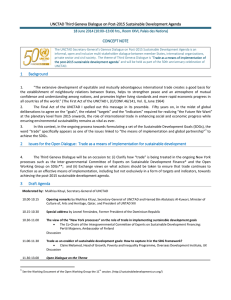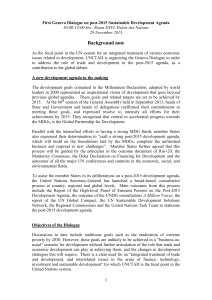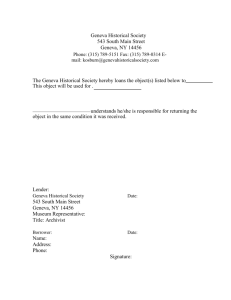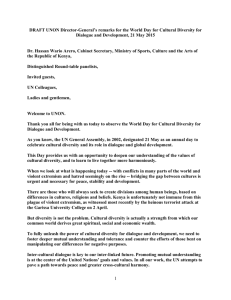UNCTAD Third Geneva Dialogue on Post-2015 Sustainable Development Agenda BACKGROUND NOTE
advertisement
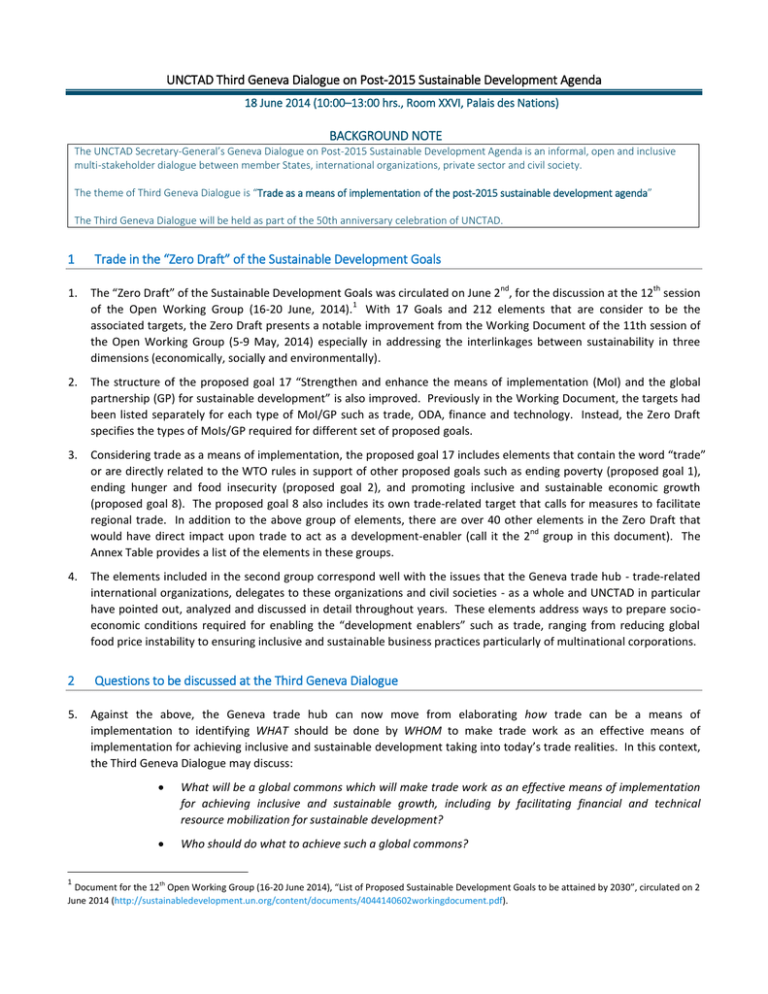
UNCTAD Third Geneva Dialogue on Post-2015 Sustainable Development Agenda 18 June 2014 (10:00–13:00 hrs., Room XXVI, Palais des Nations) BACKGROUND NOTE The UNCTAD Secretary-General’s Geneva Dialogue on Post-2015 Sustainable Development Agenda is an informal, open and inclusive multi-stakeholder dialogue between member States, international organizations, private sector and civil society. The theme of Third Geneva Dialogue is “Trade as a means of implementation of the post-2015 sustainable development agenda” The Third Geneva Dialogue will be held as part of the 50th anniversary celebration of UNCTAD. 1 Trade in the “Zero Draft” of the Sustainable Development Goals nd th 1. The “Zero Draft” of the Sustainable Development Goals was circulated on June 2 , for the discussion at the 12 session 1 of the Open Working Group (16-20 June, 2014). With 17 Goals and 212 elements that are consider to be the associated targets, the Zero Draft presents a notable improvement from the Working Document of the 11th session of the Open Working Group (5-9 May, 2014) especially in addressing the interlinkages between sustainability in three dimensions (economically, socially and environmentally). 2. The structure of the proposed goal 17 “Strengthen and enhance the means of implementation (MoI) and the global partnership (GP) for sustainable development” is also improved. Previously in the Working Document, the targets had been listed separately for each type of MoI/GP such as trade, ODA, finance and technology. Instead, the Zero Draft specifies the types of MoIs/GP required for different set of proposed goals. 3. Considering trade as a means of implementation, the proposed goal 17 includes elements that contain the word “trade” or are directly related to the WTO rules in support of other proposed goals such as ending poverty (proposed goal 1), ending hunger and food insecurity (proposed goal 2), and promoting inclusive and sustainable economic growth (proposed goal 8). The proposed goal 8 also includes its own trade-related target that calls for measures to facilitate regional trade. In addition to the above group of elements, there are over 40 other elements in the Zero Draft that nd would have direct impact upon trade to act as a development-enabler (call it the 2 group in this document). The Annex Table provides a list of the elements in these groups. 4. The elements included in the second group correspond well with the issues that the Geneva trade hub - trade-related international organizations, delegates to these organizations and civil societies - as a whole and UNCTAD in particular have pointed out, analyzed and discussed in detail throughout years. These elements address ways to prepare socioeconomic conditions required for enabling the “development enablers” such as trade, ranging from reducing global food price instability to ensuring inclusive and sustainable business practices particularly of multinational corporations. 2 5. 1 Questions to be discussed at the Third Geneva Dialogue Against the above, the Geneva trade hub can now move from elaborating how trade can be a means of implementation to identifying WHAT should be done by WHOM to make trade work as an effective means of implementation for achieving inclusive and sustainable development taking into today’s trade realities. In this context, the Third Geneva Dialogue may discuss: What will be a global commons which will make trade work as an effective means of implementation for achieving inclusive and sustainable growth, including by facilitating financial and technical resource mobilization for sustainable development? Who should do what to achieve such a global commons? Document for the 12th Open Working Group (16-20 June 2014), “List of Proposed Sustainable Development Goals to be attained by 2030”, circulated on 2 June 2014 (http://sustainabledevelopment.un.org/content/documents/4044140602workingdocument.pdf). UNCTAD Third Geneva Dialogue on Post-2015 Sustainable Development Agenda Annex Table – Trade-related Targets in the Zero-Draft (for the OWG 12th Session) st The 1 Group: Elements that directly refer to Trade (in goods and services) or to the WTO rules Proposed Goals: Under the proposed goal 17 (with the associated number for each target) 2. End hunger and food insecurity 2.11: by 2030 fully implement measures that curb excessive food price volatility and ensure proper functioning of markets 8. Promote inclusive and sustainable economic growth 8.12: improve regional and trans-border infrastructure to promote effective regional economic integration and facilitate trade [14. Attain conservation and sustainable use of marine resources, oceans and seas] [14.9: by 2020, eliminate subsidies which contributes to overcapacity and overfishing, and refrain from introducing new such subsidies, taking into account the need of developing countries, notably LDCs and SIDS] (Note: fishery subsidies have been discussed at the WTO though no agreement has been made yet.) 17. The Strengthen the means of implementation and global partnership means 1. End poverty 17.2: realize timely implementation of duty-free and quota-free market access on a lasting basis for all LDCs in accordance with WTO decisions and the Istanbul Programme of Action 17.5: ensure that adequate policy space is given to developing countries by the international organizations to enable developing countries to establish and implement their policies for poverty eradication and sustainable development 2. End hunger and food insecurity 17.7: reduce distortions in international trade, including phasing out of all forms of agricultural export subsidies as soon as possible in line with the objective set out by the WTO Ministers in the 2005 Hong Kong Ministerial Declaration 3. Attain healthy life for all 17.12: in cooperation with pharmaceutical companies, provide access to affordable essential medicines in developing countries, and support developing countries’ use of TRIPS flexibilities 8. Promote inclusive and sustainable economic growth 17.22: promote an open, rule-based, non.-discriminatory and equitable multilateral trading system, including complying with the mandate for agriculture, services and non-agricultural products of the WTO Doha Round and implementing the outcomes of the WTO Bali Declarations 17.23: Ensure speedy conclusion of an ambitious, balanced, comprehensive and developmentoriented outcome of the Doha Development Agenda of multilateral trade negotiations 17.24: improve market access for agricultural, fisheries and industrial exports of developing countries in particular African countries, LDCs, LLDCs and SIDS with a view to increasing their share of exports in global markets 17.25: increase trade-related capacity-building assistance to developing countries, including support for building their capacity to meet product regulations and standards, and enhance Aid for Trade initiatives including through the “Enhanced Integrated Framework” 9. Promote sustainable industrialization 6. 17.31: promote transfer and dissemination of clean and environmentally sound technologies to developing countries, including through the possible implementation of a UN global technology facilitation mechanism, and encourage the full use of TRIPs flexibilities 10. Reduce inequalities among nations 17.34: by 2030 reduce to 5% or below the transaction costs of migrants’ remittances, including regulatory and administrative costs 12. Promote sustainable consumption/production patterns 7. 17.39: establish and effectively implement multilateral code of conduct for multinational corporations to secure social and environmental responsibility and accountability 2|Page UNCTAD Third Geneva Dialogue on Post-2015 Sustainable Development Agenda nd The 2 Group: Elements with a strong interlinkages with trade 1. End poverty 1.4: by 2030 achieve equal access to productive employment and decent work for all, including poor, persons with disabilities, and other people in vulnerable situations as well as women and young people 1.7: pursue sustained and inclusive economic growth as a key enabler for achieving poverty eradication 2. End hunger and food insecurity 2.3: by 2030, substantially increase small-scale food producers’ incomes and productivity, including small family farmers, pastoralists and fishers, with a particular focus on women 2.4: by 2030, achieve access to adequate inputs, knowledge and productive resources, financial services and markets, especially for small and family farmers, pastoralists and fishers, with a particular focus on women 7. Ensure access to sustainable energy services 7.2: double the share of renewable energy in the global energy mix by 2030 8. Promote inclusive and sustainable economic growth 8.5: create a sound macroeconomic environment with strong fiscal and monetary policies 8.6: create an enabling environment for business with strong national economic institutions and policies that support investment and promote competition 8.7: create incentives for the development of sustainable tourism which takes into account community participation, local culture and local products 8.8: create enabling conditions for increased growth and productivity of micro-, small and mediumscale enterprises (SMEs), including through policies that promote entrepreneurship, creativity and innovation, and through improved access to markets and financial services 8.9: increase the share of high productivity sectors and activities in the economy, and strengthen productive capacity through technological upgrading, greater value addition and productive diversification, with a particular focus on LDCs 8:10: Promote greater resources efficiency of economic activities, including through sustainable supply chains, according to national circumstances and capacities 8.11: support the development of quality, reliable, sustainable and resilient infrastructure for transport, energy, water and communications, in particular in developing countries with a focus on access for the rural and urban poor 8.16: explore the possibility of a broader system of capital accounting looking beyond GDP and incorporating social, human and environmental capital 9. Promote sustainable industrialization 9.2: respect structural transformation of economies towards progressively higher level of productivity in all sectors of activities 9.5: increase industrial diversification in developing countries, including through enhanced domestic processing of raw materials and commodities and through new product development 9.6: support industrial diversification in developing countries, including through enhanced domestic processing of raw materials and commodities and trough new product development 9.9: upgrade the technological capabilities of industrial sector in developing countries, including in middle income countries, and improve industrial resources efficiency by accelerating the development, transfer and adoption of environmentally sound technologies and processess 10. Reduce inequalities among nations 10.8: establish measures at global level to reduce inequality among countries 10.10: improve regulation of global financial markets and institutions and strengthen their implementation 10.11: facilitate greater international mobility of labour while mitigating brain drain 3|Page UNCTAD Third Geneva Dialogue on Post-2015 Sustainable Development Agenda 12. Promote sustainable consumption/production patterns 12.3: significantly improve the resource efficiency of economic activities and decouple economic growth from environmental degradation, with all countries taking action, developed countries taking the lead, and developing countries following a similar patterns taking into account their development needs and capabilities 12.4: promote sound management of chemical and hazardous waste in accordance with agreed international frameworks, and by 2030 significantly reduce the release of chemicals and hazardous wastes to air, water and soil 12.9: by 2030 increase by x% the number of companies, especially publicly listed and large companies, reporting on corporate social and environmental responsibility, including integrating reporting 12.10: by 2030, increase the share of private sector actors incorporating sustainable development principles in their business practices, including sustainable supply chains, with due regard to the circumstances and capacity needs of micro- and SMEs 12.11: by 2030 increase the share of sustainable products and services in public procurement, including through competitive and transparent procurement processes 13. Promote actions to address climate change 13.4: by 20xx introduce instruments and incentives for investment in low-carbon climate solution in all relevant sectors 14. Attain conservation and sustainable use of marine resources, oceans and seas 14.5: support sustainable small-scale fisheries and aquaculture, including by providing equitable access of small-scale and artisanal fishers to fisheries and markets 14.7: by 2020, eliminate illegal, unreported and unregulated fishing and destructive fishing practices 14.9: by 2020, eliminate subsidies which contributes to overcapacity and overfishing, and refrain from introducing new such subsidies, taking into account the need of developing countries, notably LDCs and SIDS 15. protect ecosystems 15.7: ensure fair and equitable sharing of benefits arising from the utilization of genetic resources 15.8: end poaching and trafficking of endangered specifies, and end demand and supply of illegal wildlife products 15.10: ensure free prior informed consent of indigenous peoples and local communities in decision making and natural resources management, and promote the use of their traditional knowledge 4|Page UNCTAD Third Geneva Dialogue on Post-2015 Sustainable Development Agenda 17. The Strengthen the means of implementation and global partnership means 1. End poverty 17.6: support broad-based multi-stakeholder partnerships, including with civil society, the private sector, and multiple levels of government, that mobilize knowledge, expertise, technologies and financial resources to support achievement of sustainable development goals, particularly in developing countries 2. End hunger and food insecurity 17.8: improve regulation with strengthened implementation of financial institutions and financial markets, including food commodity markets, to ensure global financial stability and to help dampen food price volatility 17.9: increase investment in rural infrastructure, agricultural research, technology development, institutions and capacity building in developing countries to enhance agricultural productive capacity, particularly in countries that are net food importers 7. Ensure access to sustainable energy services 17.19: enhance international cooperation to facilitate developing countries’ access to clean energy technologies, including through appropriate partnership 8. Promote inclusive and sustainable economic growth 17.28: strengthen domestic resource mobilization of developing countries, providing international support to improving tax collection, tax and natural resource revenue transparency 17.29: promote regional and international collaboration on and access to science, technology, innovation, research and knowledge sharing, including through North-South, South-South and triangular cooperation 12. Promote sustainable consumption/production patterns 17.38: enhance international cooperation with developed countries taking the lead in implementation sustainable consumption and production patterns, including through strengthening developing countries’ scientific and technological capacities to move towards more sustainable patterns of consumption and production 14. Achieve peaceful/inclusive societies, rules of law, effective and capable institutions 17.45: cooperate globally to reduce substantially international tax evasion and avoidance 5|Page

